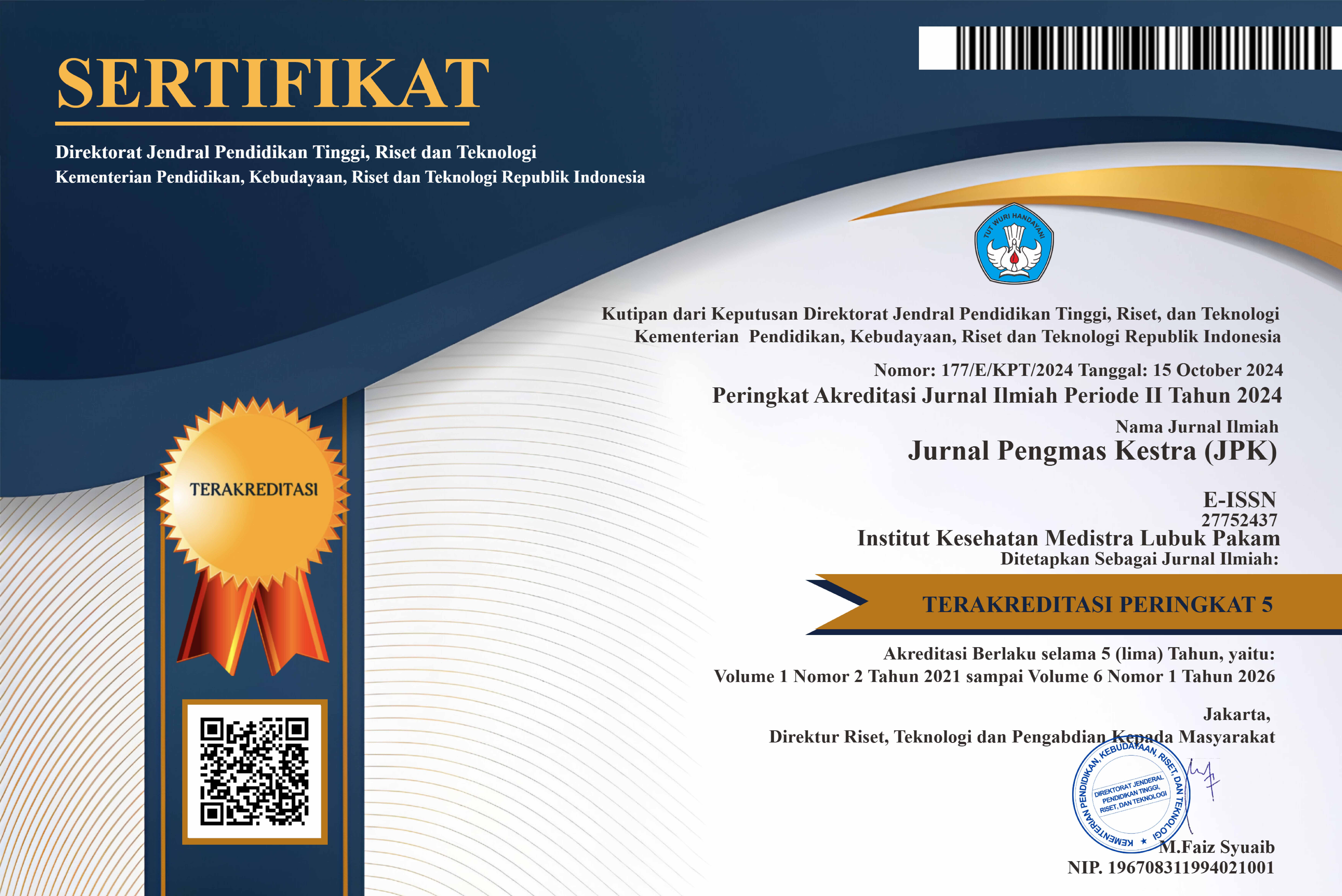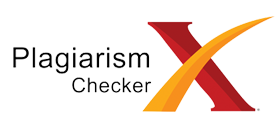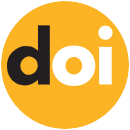Providing Education and Breastfeeding Assistance in Efforts to Increase Exclusive Breastfeeding
DOI:
https://doi.org/10.35451/jpk.v4i2.2396Keywords:
education, provision, breastfeeding, increase, exclusive breastfeedingAbstract
Breastfeeding is important for growth and development, especially in the first 6 months. Exclusive breastfeeding has the benefit of protecting against gastrointestinal, respiratory, chronic diseases and helping cognitive development. The practice of exclusive breastfeeding requires knowledge, skills and confidence in breastfeeding. Breastfeeding assistance is one of the actions that midwives can provide to mothers in helping and supporting the success of breastfeeding. The purpose of this service is to provide increased knowledge to breastfeeding mothers through education and breastfeeding assistance in theory and correct skills in increasing the provision of exclusive breastfeeding.. The methods used are lectures and demonstrations. The target of this activity is postpartum mothers from day 1 to day 4 who gave birth at the Kasih Ibu Pratama Clinic, a total of 19 postpartum mothers. Evaluation of the activity was carried out by providing pre- and post-test questionnaires and assessing the mother's skills in breastfeeding. The results of this activity are an increase in knowledge, attitudes and beliefs about breastfeeding in mothers after being given breastfeeding assistance. It is expected that midwives can maximize breastfeeding support classes for pregnant women as a planning for the future breastfeeding process and for breastfeeding mothers to guide mothers in good and consistent breastfeeding practices in achieving exclusive breastfeeding.
References
World Health Organization. Exclusive Breastfeeding. Available online: https://www.who.int/nutrition/topics/exclusive_breastfeeding/es/
Lyons KE, Ryan CA, Dempsey EM, Ross RP, Stanton C. Breast milk, a source of beneficial microbes and associated benefits for infant health. Nutrients. 2020 Apr 9;12(4):1039.
North K, Gao M, Allen G, Lee AC. Breastfeeding in a global context: epidemiology, impact, and future directions. Clinical Therapeutics. 2022 Feb 1;44(2):228-44.
Syahri IM, Laksono AD, Fitria M, Rohmah N, Masruroh M, Ipa M. Exclusive breastfeeding among Indonesian working mothers: does early initiation of breastfeeding matter?. BMC Public Health. 2024 May 3;24(1):1225.
Wu Q, Tang N, Wacharasin C. Factors influencing exclusive breastfeeding for 6 months postpartum: a systematic review. International Journal of Nursing Knowledge. 2022 Oct;33(4):290-303.
Ogbo FA, Akombi BJ, Ahmed KY, Rwabilimbo AG, Ogbo AO, Uwaibi NE, Ezeh OK, Agho KE. Breastfeeding in the community—how can partners/fathers help? A systematic review. International journal of environmental research and public health. 2020 Jan;17(2):413.
Glassman ME, Blanchet K, Andresen J, Lewis RA, Rosenthal SL. Impact of breastfeeding support services on mothers’ breastfeeding experiences when provided by an MD/IBCLC in the pediatric medical home. Clinical pediatrics. 2022 Jun;61(5-6):418-27.
Hamnøy IL, Kjelsvik M, Bærug AB, Dahl BM. A balancing act—midwives' and public health nurses' experiences with breastfeeding counselling. Scandinavian Journal of Caring Sciences. 2024 Mar;38(1):92-103.
Webber E, Wodwaski N, Busch D. Breastfeeding and human lactation curriculum survey of midwifery programs in the United States. Journal of Midwifery & Women's Health. 2022 Sep;67(5):635-43.
Wang T, Shang M, Chow KM. Effects of breastfeeding training programmes for midwives on breastfeeding outcomes: a systematic review and meta-analysis. BMC Pregnancy and Childbirth. 2023 Apr 18;23(1):262.
Jasny E, Amor H, Baali A. Mothers’ knowledge and intentions of breastfeeding in Marrakech, Morocco. Archives de Pediatrie. 2019 Jul 1;26(5):285-9.
Mohammed S, Yakubu I, Fuseini AG, Abdulai AM, Yakubu YH. Systematic review and meta-analysis of the prevalence and determinants of exclusive breastfeeding in the first six months of life in Ghana. BMC Public Health. 2023 May 19;23(1):920.
Kehinde J, O'Donnell C, Grealish A. The effectiveness of prenatal breastfeeding education on breastfeeding uptake postpartum: A systematic review. Midwifery. 2023 Mar 1;118:103579.
Morris C, Schofield P, Hirst C. Exploration of the factors influencing attitudes to breastfeeding in public. Journal of Human Lactation. 2020 Nov;36(4):776-88.
Vilar-Compte M, Teruel GM, Flores-Peregrina D, Carroll GJ, Buccini GS, Perez-Escamilla R. Costs of maternity leave to support breastfeeding; Brazil, Ghana and Mexico. Bulletin of the World Health Organization. 2020 Jun 6;98(6):382.
Tseng JF, Chen SR, Au HK, Chipojola R, Lee GT, Lee PH, Shyu ML, Kuo SY. Effectiveness of an integrated breastfeeding education program to improve self-efficacy and exclusive breastfeeding rate: A single-blind, randomised controlled study. International Journal of Nursing Studies. 2020 Nov 1;111:103770.
Wong MS, Mou H, Chien WT. Effectiveness of educational and supportive intervention for primiparous women on breastfeeding related outcomes and breastfeeding self-efficacy: A systematic review and meta-analysis. International Journal of Nursing Studies. 2021 May 1;117:103874.
Tang X, Patterson P, MacKenzie-Shalders K, van Herwerden LA, Bishop J, Rathbone E, Honeyman D, Reidlinger DP. Workplace programmes for supporting breast-feeding: a systematic review and meta-analysis. Public Health Nutrition. 2021 Apr;24(6):1501-13.
Monteiro JC, Guimarães CM, Melo LC, Bonelli MC. Breastfeeding self-efficacy in adult women and its relationship with exclusive maternal breastfeeding. Revista Latino-Americana de Enfermagem. 2020 Sep 30;28.
Downloads
Published
Issue
Section
License
Copyright (c) 2024 Diah Evawanna Anuhgera, Nikmah Jalilah

This work is licensed under a Creative Commons Attribution 4.0 International License.
Copyright in each article is the property of the Author.




















